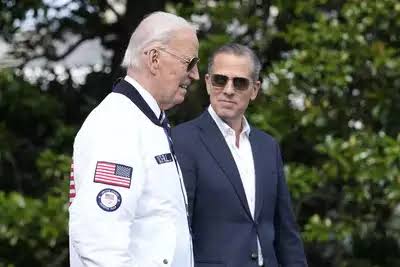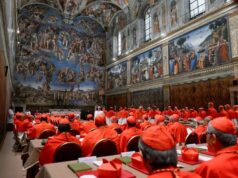Trump blasts Biden over controversial pardon of Hunter Biden

By Tajul Islam
In a dramatic move that has sent shockwaves through Washington, outgoing President Joe Biden announced a full pardon for his son, Hunter Biden, who was convicted of tax evasion and illegally purchasing a firearm.
This decision, which Biden justified as rectifying a “miscarriage of justice,” has drawn fierce condemnation from Republicans, including President-elect Donald Trump, who labelled the pardon “shocking” and an abuse of power.
The pardon, announced on Dec 01, covers all offenses committed by Hunter Biden between January 1, 2014, and December 1, 2024.
This period encompasses allegations by Republicans that Hunter Biden served as a conduit for his father in allegedly illicit business dealings in Ukraine and China.
While both Joe and Hunter Biden have consistently denied these allegations, the pardon has reignited Republican claims of corruption within the Biden family.
President Biden, in a statement from the White House, argued that his son had been unfairly targeted due to his familial connections. “Hunter Biden has been singled out and vilified because of his relationship to me,” Biden declared.
“This is not justice; it is political retribution.” Despite this justification, the decision has been met with widespread criticism, particularly from congressional Republicans and incoming President-elect Trump.
President-elect Donald Trump, who is set to take office in January, wasted no time in condemning the pardon.
Speaking through his spokesperson, Steven Cheung, Trump described the pardon as a glaring example of the political weaponization of the justice system under Democratic leadership.
“The failed witch hunts against President Trump have proven that the Democrat-controlled DOJ and other radical prosecutors are guilty of weaponizing the justice system,” Cheung said.
He vowed that Trump would restore “due process for all Americans” upon returning to the White House.Trump further escalated his criticism on his social media platform, Truth Social, where he compared Hunter Biden’s treatment to that of the January 6 Capitol riot defendants.
“Does the pardon given by Joe to Hunter include the J-6 hostages, who have now been imprisoned for years? Such an abuse and miscarriage of justice!” Trump wrote, invoking the ongoing controversy surrounding the prosecution of those involved in the Capitol attack.
Republican lawmakers have also voiced strong opposition to the pardon, accusing Biden of using his presidential authority to shield his family from accountability.Senator Chuck Grassley called the decision “shocking,” while Congresswoman Marjorie Taylor Greene declared it to be “Joe Biden’s admission that Hunter is a criminal.”
Greene added, “This pardon is not about justice; it’s about protecting the Biden family’s influence-peddling schemes.”Senator Josh Hawley took to X (formerly Twitter), describing the move as “an outrageous abuse of the rule of law – all to protect the Biden family business of selling access and influence.” Congressman Andy Biggs echoed these sentiments, claiming, “Joe Biden will go down as one of the most corrupt presidents in American history.
”The Republican-controlled House Committee on Oversight and Accountability released a scathing statement, calling the pardon an “unprecedented abuse of power” that tarnished the office of the presidency.
The pardon raises significant questions about the boundaries of presidential authority and the potential for perceived conflicts of interest.
Critics argue that Biden’s decision undermines the rule of law, while his supporters contend that the pardon was necessary to prevent Hunter Biden from being used as a political pawn.
Hunter Biden’s legal troubles have long been a point of contention. He was convicted earlier this year on charges of failing to pay millions in taxes and for lying on a federal form when purchasing a gun, claiming he was not a drug user despite his struggles with addiction being well-documented.
His sentencing was scheduled for this month, but the pardon nullifies these penalties and clears him of legal jeopardy related to these convictions.
Additionally, the pardon’s scope – covering a decade of potential offenses – is unprecedented in modern U.S. history. It has brought renewed scrutiny to allegations that Hunter Biden exploited his father’s political connections to secure lucrative business deals abroad.
The fallout from this decision highlights the deeply polarized nature of American politics. While Biden’s supporters view the pardon as an act of compassion and justice, his detractors see it as a brazen attempt to protect his family at the expense of public trust in the legal system.
For President-elect Trump, the pardon serves as a rallying cry for his incoming administration. Trump has promised sweeping reforms to address what he sees as a broken justice system, and his allies are already framing the pardon as proof of Democratic corruption.
“This is why Americans elected President Trump back to the White House,” Cheung stated. “They want a leader who will fight against the abuse of power and restore fairness to our government.”
The pardon of Hunter Biden sets the stage for a turbulent transition of power in Washington. Republicans are expected to use their majority in the House to intensify investigations into the Biden family’s business dealings.
House Oversight Committee Chairman James Comer has pledged to hold Biden accountable. “This isn’t over,” Comer said in a statement. “The American people deserve the truth about how the Biden family has used public office for personal gain.”
As the nation prepares for Trump’s second term, the controversy surrounding Hunter Biden’s pardon underscores the challenges ahead for a deeply divided government. Whether Biden’s decision will be remembered as an act of justice or a breach of public trust remains a point of fierce debate.
In the meantime, the controversy adds another chapter to an already tumultuous period in American politics, with implications that could resonate far beyond the current news cycle.




